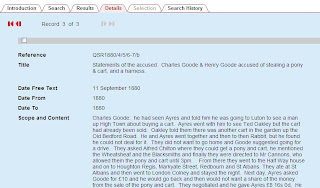Unfortunately for Drage the constable George Mardlin said he did not appear drunk; he had also previously been convicted at the Northampton Quarter Sessions of June 1869 for stealing more than £5 from the house of Elizabeth Copson at Wellingborough (Northants), for which he had served 12 months in the House of Correction at Northampton. This time he was sentenced to 6 months imprisonment with hard labour, to be followed by 7 years supervision by the police.
The letter is written on a standard form issued by the Gaol to prisoners awaiting trial which includes printed instructions on the front cover:
Persons writing to Prisoners are to TAKE NOTICE that the permission to write and receive Letters is not given to Prisoners for the purpose of hearing the news of the day, but to keep up a correspondence with their Relatives, and to address them on the subject of their trials; they will not be allowed to give or receive any improper advice or hints, or use or receive any unbecoming language.QSR1871/1/5/3/b; QSR1871/1/6/3/b
As all Letters sent into the Prison are read by the Governor, they ought not to be of unnecessary length.
Visiting days are Wednesdays and Saturdays from 10 to 12 in the morning and from 2 to 4 in the afternoon; the visits must not exceed twenty minutes.

 Extract from the Bedfordshire and Luton Archive and Records Service catalogue
Extract from the Bedfordshire and Luton Archive and Records Service catalogue